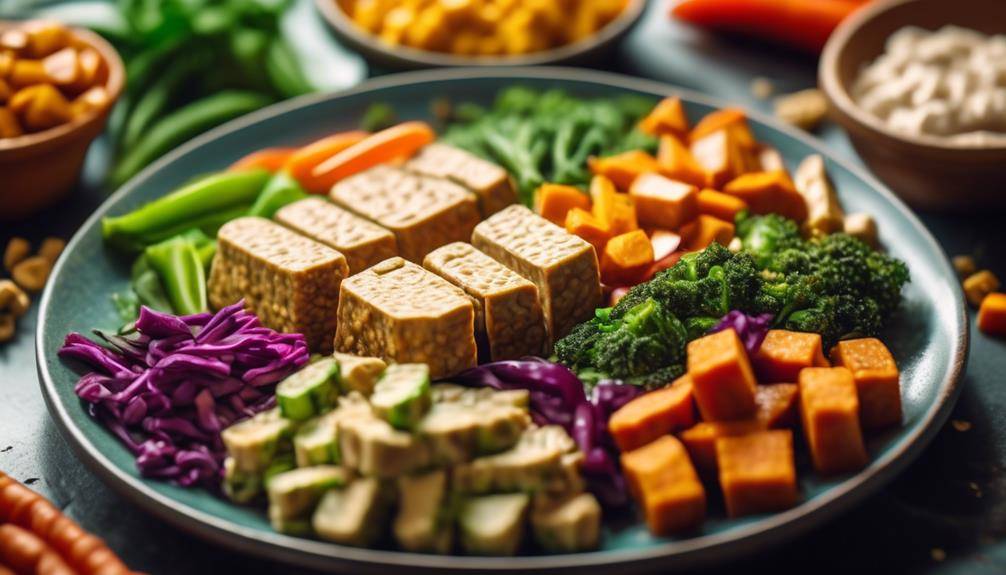Innovative Plant Protein Substitutes in Food

Imagine biting into a juicy, mouthwatering burger that is not made of traditional beef, but instead, is crafted from a Innovative Plant Protein Substitutes in Food that perfectly mimics the taste and texture of meat. As the demand for sustainable and cruelty-free food options continues to rise, innovative plant protein substitutes have emerged as a game-changer in the culinary world.
These substitutes offer a tantalizing solution to those seeking healthier and more environmentally-friendly alternatives to traditional animal-based protein sources. But what are these substitutes, and how do they measure up in terms of taste and nutritional value? Join us on a journey as we explore the exciting world of innovative plant protein substitutes, and discover how they are revolutionizing the way we think about food.
Soy Protein
Soy protein is a widely-used plant-based protein substitute in various food products. It is derived from soybeans and is known for its high nutritional value and numerous health benefits. Soy protein is considered a complete protein as it contains all the essential amino acids required by the body.
One of the key nutritional benefits of soy protein is its high protein content. It contains about 20 grams of protein per 100 grams, making it an excellent source of protein for vegetarians and vegans. The protein in soy is also easily digestible, making it suitable for individuals with digestive issues or those with sensitive stomachs.
In addition to its protein content, soy protein is also rich in other essential nutrients. It is a good source of fiber, vitamins, and minerals such as iron, calcium, and magnesium. These nutrients are important for overall health and play a role in various bodily functions.
The health benefits associated with consuming soy protein are vast. Studies have shown that it may help reduce the risk of heart disease by lowering bad cholesterol levels. Soy protein has also been found to have a positive impact on bone health, as it contains isoflavones that mimic the effects of estrogen and help maintain bone density.
Furthermore, soy protein has been linked to a reduced risk of certain types of cancer, such as breast and prostate cancer. The isoflavones in soy have antioxidant properties and may inhibit the growth of cancer cells.
Pea Protein
Pea protein is a highly nutritious plant-based protein substitute derived from peas that offers a range of health benefits. This protein alternative has gained popularity in recent years due to its numerous advantages.
Here are some key points about pea protein:
- Environmental Impact: Pea protein has a lower environmental impact compared to animal-based proteins, such as meat and dairy. Peas require less water, land, and energy to grow, making them a more sustainable option. Additionally, cultivating peas can help improve soil quality by fixing nitrogen levels.
- Nutritional Profile: Pea protein is a complete protein source, meaning it contains all nine essential amino acids that the body needs. It is also rich in branched-chain amino acids (BCAAs), which are important for muscle recovery and growth. Pea protein is low in fat and carbohydrates, making it suitable for those following a low-calorie or low-carb diet.
- Digestibility: Pea protein is easily digestible and does not cause bloating or digestive discomfort for most people. It is a suitable option for individuals with food sensitivities or allergies, including those who are lactose intolerant or allergic to soy.
- Pea Protein in Sports Nutrition: Pea protein has gained popularity among athletes and fitness enthusiasts due to its high protein content and amino acid profile. It can support muscle recovery, promote muscle growth, and improve exercise performance. Pea protein is commonly used in protein powders, bars, and shakes targeted towards the sports nutrition market.
Jackfruit
Jackfruit is a plant-based protein substitute that offers numerous nutritional benefits. It is rich in fiber, vitamins, and minerals, making it a valuable addition to a balanced diet. Additionally, jackfruit’s culinary versatility allows it to be used in various dishes, from savory meals to sweet desserts, making it a versatile option for those looking to incorporate more plant proteins into their diet.
Nutritional Benefits
With its rich assortment of essential vitamins and minerals, jackfruit offers a nutritious alternative for those seeking plant-based protein substitutes in their diet. Here are some key nutritional benefits of jackfruit:
- High in Fiber: Jackfruit is a great source of dietary fiber, promoting digestive health and preventing constipation.
- Rich in Vitamins: It contains a variety of vitamins, including vitamin C, vitamin A, and vitamin B6, which are essential for immune function, vision health, and brain development.
- Abundance of Minerals: Jackfruit is packed with minerals such as potassium, magnesium, and calcium, which support heart health, bone strength, and muscle function.
- Superior Amino Acids: Jackfruit provides all the essential amino acids required by the body, making it a complete protein source.
Incorporating jackfruit into your diet can not only contribute to your daily protein intake but also provide you with a slew of essential nutrients for overall well-being.
Culinary Versatility
Having explored the nutritional benefits of jackfruit, it is now important to examine its culinary versatility as a plant-based protein substitute. Jackfruit’s unique texture and mild flavor make it a versatile ingredient in various culinary techniques. Its fibrous and meaty texture allows it to be used as a meat substitute in dishes like pulled jackfruit sandwiches or jackfruit tacos.
The mild flavor of jackfruit allows it to easily absorb the flavors of spices and seasonings, making it suitable for a wide range of flavor pairings. It can be used in savory dishes like curries, stir-fries, and stews, as well as in sweet dishes like desserts and smoothies. Jackfruit’s versatility in both savory and sweet applications makes it a valuable ingredient for those seeking plant-based protein alternatives in their diet.
Tempeh
Tempeh, a fermented soybean product, offers a nutritious and versatile plant-based protein option in food. This Indonesian staple has gained popularity worldwide due to its unique taste and texture. Tempeh is made by fermenting soybeans with a specific type of mold called Rhizopus oligosporus. During the fermentation process, the mold binds the soybeans together, creating a firm cake-like texture with a nutty flavor.
Tempeh is not only a great source of protein but also provides several health benefits. It is rich in essential amino acids, making it a complete protein source for vegetarians and vegans. Additionally, tempeh contains dietary fiber, which aids in digestion and helps maintain a healthy gut. It is also a good source of iron, calcium, and magnesium, important minerals for overall well-being.
Here are some popular ways to incorporate tempeh into your diet:
- Tempeh stir-fry: Cut tempeh into bite-sized pieces and stir-fry it with your favorite vegetables and sauce for a quick and nutritious meal.
- Tempeh burgers: Mash tempeh with spices, herbs, and binders like breadcrumbs or flaxseed meal to create flavorful and satisfying veggie burgers.
- Tempeh tacos: Crumble tempeh and cook it with taco seasoning for a delicious and protein-packed filling. Serve it in taco shells with your favorite toppings.
- Tempeh marinades: Marinate tempeh in a mixture of soy sauce, vinegar, and spices for added flavor. Grill or bake it for a tasty protein option.
With its versatility and health benefits, tempeh is a fantastic addition to any plant-based diet. Experiment with different tempeh recipes to discover new and exciting ways to enjoy this nutritious plant protein substitute.
Seitan
Seitan, also known as wheat meat or wheat gluten, is a plant-based protein substitute that offers various benefits. It is an excellent source of protein and easily absorbs flavors, making it a versatile ingredient for cooking. Whether you’re looking to increase your protein intake or explore new culinary possibilities, seitan can be a valuable addition to your diet.
Benefits of Seitan
Seitan offers numerous benefits as a plant-based protein substitute in culinary applications.
- Versatile cooking techniques: Seitan can be grilled, sautéed, or stir-fried, making it adaptable to various recipes and cuisines.
- High protein content: Seitan is a concentrated source of protein, making it an ideal option for those following a vegetarian or vegan diet.
- Low in fat and cholesterol: Seitan is naturally low in fat and cholesterol, making it a heart-healthy alternative to animal-based proteins.
- Nutrient-rich: Seitan is rich in essential minerals such as iron and selenium, which are important for maintaining overall health.
Cooking With Seitan
When incorporating seitan into your culinary creations, you’ll discover a versatile and protein-rich ingredient that enhances a variety of dishes. Seitan, made from wheat gluten, has a meat-like texture that makes it a popular choice for vegetarian or vegan dishes. Cooking with seitan involves various techniques to maximize its flavor profiles.
One common method is marinating seitan in a mixture of herbs, spices, and sauces to infuse it with flavors. You can then grill, bake, or sauté the marinated seitan to achieve a delicious and satisfying dish. Another technique is simmering seitan in broths or stews, allowing it to absorb the flavors of the surrounding ingredients. By experimenting with different cooking techniques, you can create flavorful seitan dishes that will impress even the most discerning palates.
Lentils
Lentils are a nutritious plant protein substitute commonly used in various cuisines around the world. They are not only versatile but also offer a range of health benefits. Here are a few key points about lentils:
- Lentil based recipes: Lentils can be used in a variety of dishes, from soups and stews to salads and veggie burgers. Their mild flavor allows them to easily absorb the flavors of other ingredients, making them a great addition to many recipes. Lentil curry, lentil soup, and lentil tacos are just a few examples of the delicious dishes you can create with lentils.
- Health benefits of lentils: Lentils are nutritional powerhouses. They are a rich source of plant-based protein, fiber, and essential vitamins and minerals. Incorporating lentils into your diet can help promote heart health, manage blood sugar levels, and support digestion. They are also low in fat and cholesterol-free, making them a healthy choice for those looking to maintain a balanced diet.
- Protein content: Lentils are an excellent source of protein, especially for vegetarians and vegans. With approximately 18 grams of protein per cooked cup, lentils can be a valuable addition to a plant-based diet. Protein is essential for building and repairing tissues, and lentils provide a high-quality, plant-based protein option.
- Environmental impact: Lentils are not only good for your health but also for the environment. They have a low carbon footprint and require less water to grow compared to other protein sources like meat. Incorporating lentils into your meals can help reduce greenhouse gas emissions and promote sustainable food choices.
Quinoa
Quinoa is a highly nutritious plant protein substitute that offers numerous health benefits. It is rich in essential amino acids, fiber, and minerals, making it an excellent choice for those looking to increase their protein intake. Additionally, quinoa is a versatile ingredient that can be used in a variety of dishes, from salads to stir-fries, providing a satisfying and nutritious addition to any meal.
Quinoa’s Nutritional Benefits
One of the most nutritious plant-based protein substitutes available is quinoa, a pseudocereal grain native to the Andean region of South America. Quinoa offers several nutritional benefits that make it a popular choice among health-conscious individuals.
- Quinoa is a complete protein source, containing all nine essential amino acids that the body needs for optimal functioning.
- It is rich in dietary fiber, which aids in digestion and helps maintain a healthy weight.
- Quinoa is also a good source of vitamins and minerals, including magnesium, iron, and phosphorus.
- In addition to its nutritional value, quinoa has cultural significance for the indigenous peoples of the Andean region, who have been cultivating and consuming it for thousands of years.
Furthermore, quinoa has a relatively low environmental impact compared to other crops, as it requires less water and land to grow. Its resilience to harsh climates and ability to thrive in diverse ecosystems make it a sustainable choice for food production.
Quinoa as a Versatile Ingredient
With its impressive nutritional profile, quinoa can be utilized as a versatile ingredient in various culinary creations. Quinoa’s unique combination of essential amino acids, vitamins, and minerals makes it a popular choice for health-conscious individuals.
When used in recipes, quinoa adds a nutty flavor and a slightly crunchy texture. It can be used as a base for salads, stir-fries, and grain bowls, or even as a substitute for rice or pasta. Quinoa’s health benefits include its high protein content, which helps to support muscle growth and repair. Additionally, it is a good source of fiber, which aids in digestion and helps to maintain a healthy weight. Incorporating quinoa into your diet can provide a delicious and nutritious alternative to traditional grains.
Hemp Seeds
Hemp seeds are a versatile and nutrient-rich plant protein substitute commonly used in food products. They have gained popularity in recent years due to their numerous health benefits and culinary versatility. Here are some key facts about hemp seeds:
- Nutritional powerhouse: Hemp seeds are packed with essential nutrients, including protein, fiber, healthy fats, vitamins, and minerals. They are a complete source of protein, meaning they contain all nine essential amino acids that our bodies need but cannot produce on their own.
- Heart-healthy fats: Hemp seeds are rich in omega-3 and omega-6 fatty acids, which are important for brain health, reducing inflammation, and promoting heart health. The ratio of omega-6 to omega-3 fatty acids in hemp seeds is considered optimal for human health.
- Versatile ingredient: Hemp seeds can be incorporated into a wide variety of recipes, making them a versatile plant protein substitute. They can be sprinkled on salads, blended into smoothies, added to baked goods, or even used as a topping for yogurt or oatmeal.
- Health benefits: Consuming hemp seeds has been linked to various health benefits. They may help reduce the risk of heart disease, support digestion and gut health, aid in weight management, and promote healthy skin due to their high content of antioxidants and essential fatty acids.
Incorporating hemp seeds into your diet can be as simple as trying out some hemp seed recipes or adding them to your favorite dishes. Whether you’re looking to increase your protein intake, boost your omega-3 fatty acid levels, or simply diversify your diet, hemp seeds are a nutritious and delicious option to consider.
Chia Seeds
To further explore protein substitutes in food, let’s now shift our focus to the nutritional powerhouse known as chia seeds. Chia seeds, scientifically known as Salvia hispanica, have gained popularity in recent years due to their impressive health benefits and versatile culinary uses. These tiny black or white seeds originate from the desert plant Salvia hispanica, which is native to Mexico and Guatemala. Chia seeds have been used for centuries as a dietary staple by the Aztecs and Mayans, and they are now making a comeback as a superfood.
Chia seeds are packed with essential nutrients, making them a valuable addition to any diet. They are an excellent source of plant-based protein, providing all nine essential amino acids that the body needs for optimal health. In fact, chia seeds contain more protein than most other plant-based foods, making them a great option for vegetarians and vegans. Additionally, chia seeds are rich in fiber, omega-3 fatty acids, antioxidants, vitamins, and minerals, including calcium, magnesium, and phosphorus.
One of the most impressive aspects of chia seeds is their ability to absorb liquid and form a gel-like consistency. This unique property makes them an ideal ingredient for various recipes. You can use chia seeds to thicken smoothies, puddings, and sauces, or as an egg substitute in baking. Chia seed recipes are abundant and range from simple additions to meals, such as sprinkling them on top of yogurt or oatmeal, to more complex dishes like chia seed energy bars or chia seed crackers.
In addition to their versatility in the kitchen, chia seeds offer numerous health benefits. Their high fiber content promotes healthy digestion and can help regulate blood sugar levels. The omega-3 fatty acids found in chia seeds contribute to heart health, reduce inflammation, and support brain function. Chia seeds also have antioxidant properties, which can protect against cellular damage and contribute to overall well-being.
Spirulina
Spirulina, a type of blue-green algae, is a nutrient-dense superfood that offers a wide range of health benefits. This single-celled organism has gained popularity as a plant protein substitute in various food products due to its impressive nutritional profile. Here are some key points about spirulina:
- Rich in Protein: Spirulina is a complete protein source, meaning it contains all the essential amino acids our body needs. It is particularly beneficial for vegans and vegetarians who may struggle to meet their protein requirements. Incorporating spirulina into your diet can help support muscle growth, repair tissues, and enhance overall energy levels.
- Packed with Antioxidants: Spirulina is a potent source of antioxidants, including phycocyanin, which gives it its vibrant blue-green color. These antioxidants help protect our cells from oxidative stress caused by free radicals, reducing the risk of chronic diseases such as heart disease, diabetes, and certain cancers.
- Immune-Boosting Properties: Spirulina has been shown to enhance immune function by stimulating the production of antibodies and natural killer cells. This can help strengthen our body’s defense against infections and promote overall immune health.
- Potential Anti-Inflammatory Effects: Studies suggest that spirulina may possess anti-inflammatory properties, thanks to its high content of phycocyanin. Chronic inflammation is associated with various diseases, including obesity, heart disease, and diabetes. Including spirulina in your diet may help reduce inflammation and improve overall health.
Incorporating spirulina into your diet is easy, as it can be used in various recipes. You can add it to smoothies, energy bars, or even sprinkle it over salads for an extra nutritional boost. However, it’s important to note that spirulina supplements may interact with certain medications, so it’s always best to consult with a healthcare professional before adding them to your routine.
Nutritional Yeast
Nutritional yeast, another plant protein substitute often used in food products, offers a unique set of nutritional benefits. This versatile ingredient is a deactivated strain of Saccharomyces cerevisiae, a type of yeast that is grown on molasses or other nutrient-rich mediums. Nutritional yeast is known for its cheesy, nutty flavor, making it a popular choice for vegans and those with lactose intolerance who are looking to add a savory taste to their dishes.
One of the key benefits of nutritional yeast is its high protein content. Just two tablespoons provide about 9 grams of complete protein, meaning it contains all the essential amino acids that the body needs. This makes it an excellent option for individuals following a plant-based diet or looking to increase their protein intake without consuming animal products. Additionally, nutritional yeast is low in fat and carbohydrates, making it a suitable choice for those watching their calorie intake.
Nutritional yeast is also a great source of various vitamins and minerals. It is particularly rich in B vitamins, including thiamine, riboflavin, niacin, and vitamin B12. B vitamins play a crucial role in energy production, brain function, and the formation of red blood cells. While nutritional yeast is a natural source of B vitamins, it is important to note that the vitamin B12 content may vary depending on the brand. Therefore, individuals who rely solely on nutritional yeast for their vitamin B12 intake should consider fortified options or supplements to ensure adequate levels.
Cooking with nutritional yeast is simple and versatile. It can be sprinkled onto popcorn, roasted vegetables, or pasta dishes for added flavor. Nutritional yeast can also be used as a thickener in sauces, dressings, and dips. Its cheesy taste makes it an excellent substitute for grated cheese in recipes, providing a savory flavor without the need for dairy. However, it is important to remember that nutritional yeast should not be used as a direct substitute for active yeast in baking, as it does not have leavening properties.
Edamame
Edamame, a popular plant protein substitute, offers a range of nutritional benefits and is commonly used in various food products.
- High in protein: Edamame is a great source of plant-based protein, making it an excellent option for individuals following a vegetarian or vegan diet. With approximately 8 grams of protein per half cup serving, it can contribute to meeting your daily protein requirements.
- Rich in fiber: Fiber is essential for a healthy digestive system, and edamame is packed with it. Consuming foods high in fiber can help regulate bowel movements, promote satiety, and support overall gut health.
- Loaded with vitamins and minerals: Edamame is a nutrient-dense food, providing a range of vitamins and minerals such as vitamin K, folate, iron, and magnesium. These nutrients play vital roles in various bodily functions, including blood clotting, cell division, and energy production.
- Versatile ingredient: Edamame can be incorporated into a variety of dishes and snacks. From adding it to salads and stir-fries to making edamame hummus or edamame-based veggie burgers, there are numerous creative ways to enjoy this nutritious ingredient.
In addition to its nutritional benefits, edamame snacks and recipes are gaining popularity due to their delicious taste and versatility. Edamame can be enjoyed as a standalone snack, lightly seasoned with salt, or used as an ingredient in dishes like sushi rolls or pasta salads. Its mild and slightly nutty flavor makes it easy to incorporate into different culinary creations.
Whether you’re looking for a high-protein snack or a plant-based ingredient to elevate your recipes, edamame is a versatile and nutritious option worth trying. With its abundance of protein, fiber, vitamins, and minerals, it can be a valuable addition to a balanced and healthy diet.
Chickpeas
Chickpeas, also known as garbanzo beans, are a versatile legume that offers a variety of nutritional benefits and can be incorporated into a wide range of dishes. These legumes have gained popularity in recent years due to their innovative uses and environmental benefits.
One of the innovative uses of chickpeas is their transformation into flour. Chickpea flour, also known as gram flour, is gluten-free and can be used as a substitute for traditional wheat flour in baking. It adds a nutty flavor and a dense texture to baked goods, making it a great option for those with gluten sensitivities or allergies.
Chickpeas are also the main ingredient in the production of plant-based meat alternatives. Their high protein content and ability to mimic the texture of meat make them a perfect ingredient for creating vegan or vegetarian burgers, sausages, and meatballs. These plant-based alternatives not only provide a sustainable protein source but also offer a healthier option for individuals looking to reduce their meat consumption.
From an environmental standpoint, chickpeas have several benefits. They require less water to grow compared to other crops, making them a more sustainable option for farmers. Additionally, they have the ability to fix nitrogen in the soil, reducing the need for synthetic fertilizers and promoting soil health.
Innovative Plant Protein Substitutes in Food; Frequently Asked Questions
How Can Plant Protein Substitutes Be Used in Baking and Cooking?
You can use plant protein substitutes in baking and cooking to create delicious and nutritious alternatives. They offer a range of culinary applications, providing baking alternatives that are both innovative and healthy.
What Are the Potential Health Benefits of Incorporating Plant Protein Substitutes Into One’s Diet?
Incorporating plant protein substitutes into your diet can have potential health benefits. They are rich in nutrients, low in saturated fats, and may reduce the risk of chronic diseases. Additionally, they have a lower potential environmental impact and can be cost-effective.
Are There Any Potential Side Effects or Allergies Associated With Consuming Plant Protein Substitutes?
There may be potential side effects or allergies associated with consuming plant protein substitutes. It is important to be aware of any personal sensitivities or reactions and consult with a healthcare professional if needed.
Can Plant Protein Substitutes Provide All the Essential Amino Acids That Our Bodies Need?
Plant protein substitutes can provide all essential amino acids necessary for your body. Incorporating them into your diet may aid in weight loss and reduce the environmental impact of food production.
Are There Any Specific Cooking Techniques or Tips for Maximizing the Taste and Texture of Plant Protein Substitutes?
To maximize the taste and texture of plant protein substitutes, try using cooking techniques like marinating, grilling, or sautéing. Experiment with different spices, herbs, and sauces to enhance flavor.
Conclusion
In conclusion, these innovative plant protein substitutes, such as soy protein, pea protein, jackfruit, tempeh, seitan, spirulina, nutritional yeast, edamame, and chickpeas, offer a promising alternative for individuals seeking to increase their protein intake while reducing their reliance on animal products. These plant-based options not only provide essential amino acids but also offer various health benefits, including improved heart health and reduced environmental impact. Incorporating these substitutes into one’s diet can contribute to a more sustainable and nutritious food system.








